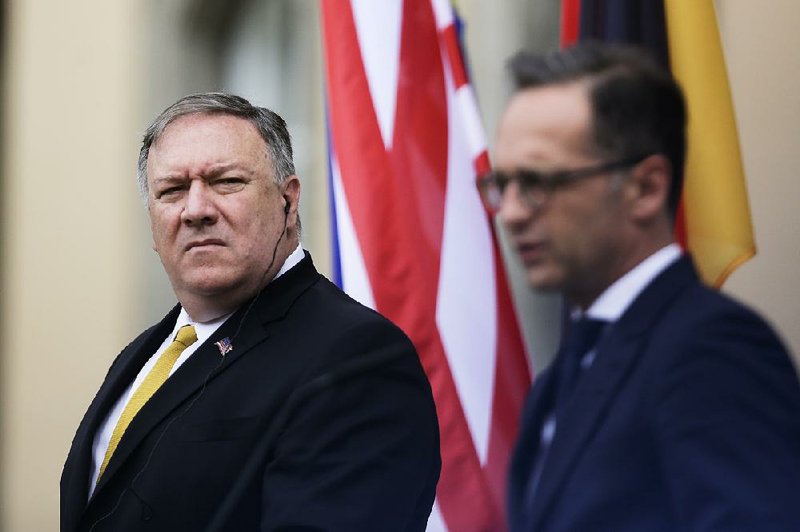BERN, Switzerland -- Secretary of State Mike Pompeo took the United States' campaign against Iran to Europe for the third time in a month as Middle East tensions heightened, raising the risk of open conflict, which has unnerved American allies.
As the Middle East buzzed with bellicose rhetoric between Iran and its U.S.-backed Gulf Arab neighbors, Pompeo was in Germany and Switzerland making the case that Washington is not looking for war and wants help in cooling the situation. But he said the U.S. will not relent on a punishing U.S. sanctions campaign targeting Iran.
Coming after President Donald Trump on Thursday renewed his willingness to talk with Iran's leadership, Pompeo's trip has raised speculation that the administration may be looking to open a channel of communication with the Islamic Republic.
Germany sent a senior diplomat to Iran earlier this week and Switzerland has long represented U.S. interests there.
Pompeo's Iran-related diplomacy has already taken him to Iraq, Britain, Belgium and Russia since early May. That's when tensions flared after U.S. allegations of increased threats from Iran that have now led to additional military deployments and accusations that Iranian proxies sabotaged oil tankers in the Persian Gulf and conducted drone attacks in Saudi Arabia.
On Friday, it coincided with Saudi calls for Iranian aggression to be dealt with firmly and the release of the U.N. atomic watchdog's quarterly report on Iran's compliance with the 2015 nuclear deal. Trump withdrew the U.S. from the deal last year and has steadily reinstated sanctions on Iran, sparking protests from Tehran, which has threatened to walk away from the deal.
The report from the International Atomic Energy Agency in Vienna said Iran continued to stay within the limitations set by the 2015 deal but for the first time raised questions about its adherence to a key provision intended to limit the country's use of advanced centrifuges that can enrich uranium. The seriousness of the issue was not immediately clear, although a senior diplomat said discussions were ongoing about how to resolve the matter.
While in past reports the agency said Iran's research and development on enrichment "has been conducted using centrifuges within the limits defined in the [Joint Comprehensive Plan of Action]," the Friday report instead changed the wording to say it "has been conducted using centrifuges specified in the [Joint Comprehensive Plan of Action]."
A centrifuge is a device that enriches uranium by rapidly spinning uranium hexafluoride gas. Under the atomic accord, Iran has been limited to operating 5,060 older-model IR-1 centrifuges.
In a footnote, the agency said that "up to 33" more advanced IR-6 centrifuges have been installed and that "technical discussions in relation to the IR-6 centrifuges are ongoing."
U.S. officials had no immediate comment on the report but the question about Iranian compliance was likely to bolster Pompeo's case for a tough stance as he opened his European tour in Germany, which along with Britain and France, remains a party to the Iran deal.
Pompeo met Chancellor Angela Merkel a day after she delivered apparent criticism of Trump in a commencement speech to Harvard University.
Without directly naming Trump, Merkel told Harvard graduates that they should "tear down walls of ignorance" and reject isolationism as they tackle global problems. She also said leaders should not "describe lies as truth and truth as lies."
Merkel said before the meeting with Pompeo that they would discuss how to prevent Iran from getting nuclear weapons and "how we prevent other aggressive actions by Iran."
After talks with German Foreign Minister Heiko Maas, Pompeo said Washington will not stand in the way of a system Europeans are developing to shield companies dealing with Iran from American sanctions, so long as it provides only humanitarian and other permitted goods.
Pompeo said the U.S. does not take issue with the system known as Instex, so long as it deals with goods not subject to sanctions.
"When we think about Instex, if it's aimed at facilitating the movement of goods that are authorized to move, it's unproblematic," he said.
From Berlin, Pompeo traveled to Switzerland for an extended stop in the country that represents the United States diplomatically in Iran and has in the past been an intermediary between the two. His three days in Bern will be the first visit to the Swiss capital by a secretary of state in more than two decades.
U.S. officials have downplayed speculation that Pompeo will use his time in Switzerland to try to open a direct line to the Iranians.
Information for this article was contributed by Geir Moulson, Kiyoko Metzler, David Rising, Jon Gambrell and Amir Vahdat of The Associated Press.
A Section on 06/01/2019

